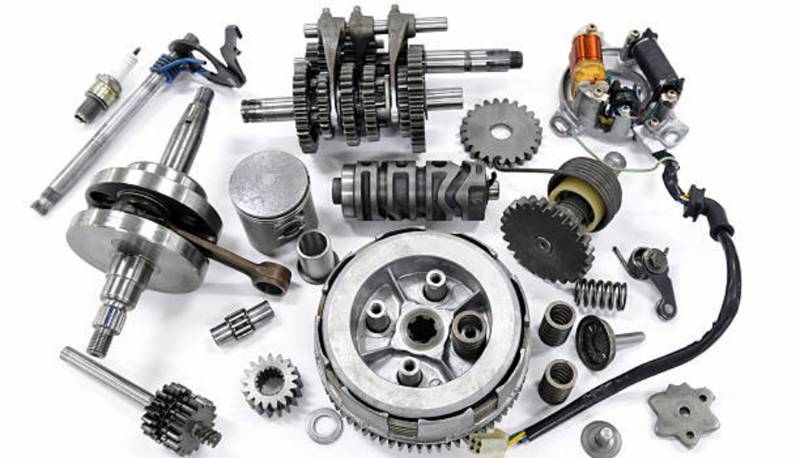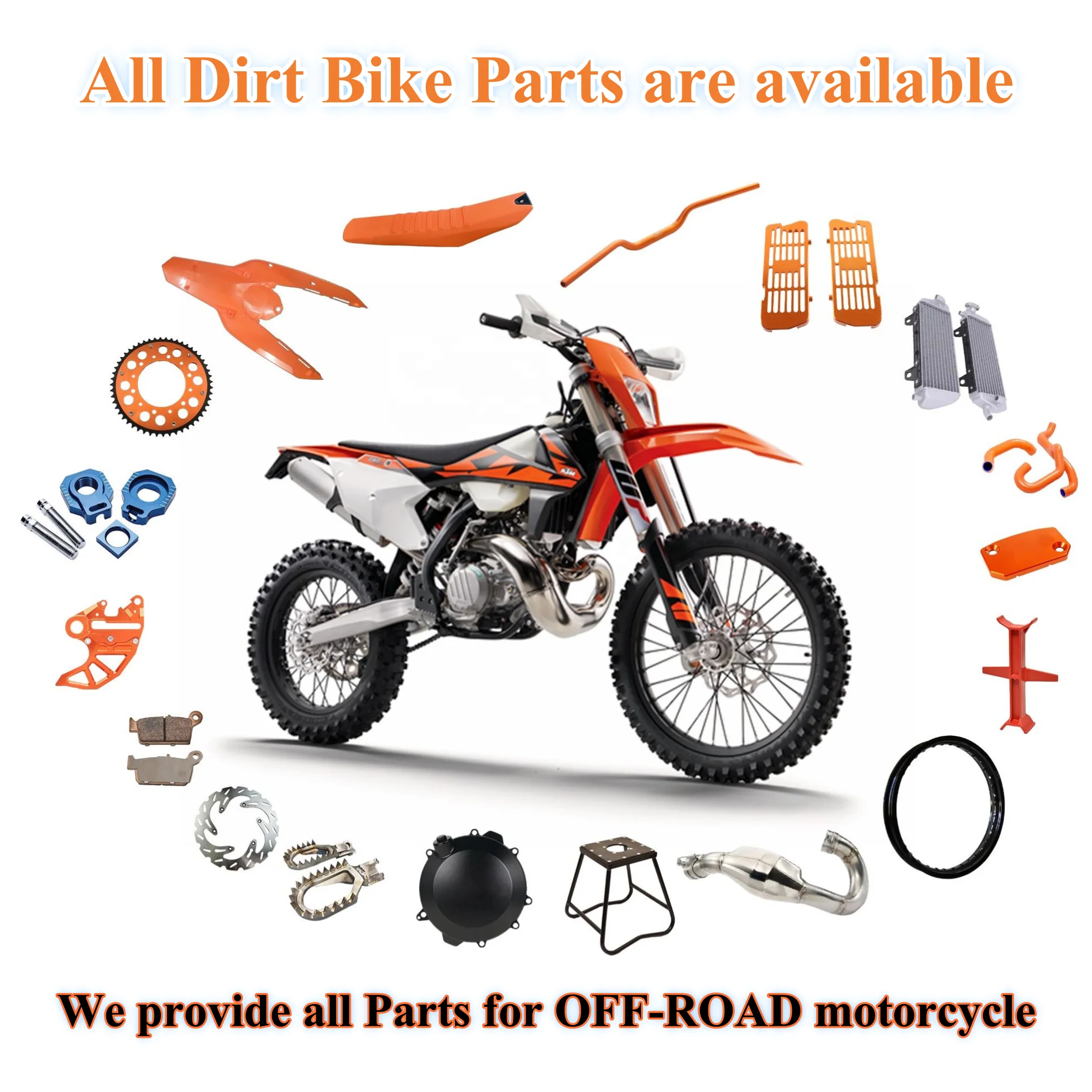Discover the Crucial Motorcycle Parts You Need for Optimum Performance
Recognizing the necessary parts of a motorbike is essential for achieving peak performance. Each part, from the engine to the stopping system, plays a critical duty in general functionality and safety. Routine maintenance can avoid unanticipated failings and boost the riding experience. However, numerous motorcyclists forget the details of these systems. Uncovering just how they collaborate can bring about a more efficient trip. What important elements should every motorcyclist focus on?
The Engine: The Heart of Your Bike
The engine works as the core part of a bike, driving its efficiency and defining its abilities. It is in charge of transforming gas right into power, which powers the bike onward. Numerous sorts of engines are utilized, including single-cylinder, V-twin, and inline configurations, each offering distinctive characteristics matched for various riding designs and functions. The engine dimension, commonly gauged in cubic centimeters (cc), substantially affects performance, with larger engines generally giving even more power and torque.Furthermore, the engine's design and technology, such as gas shot systems or air-cooling versus liquid-cooling, impact efficiency and integrity. Upkeep is necessary for peak operation; factors like normal oil modifications and checking spark plugs guarantee durability. Riders usually consider an engine's responsiveness and level of smoothness, as these features improve the general riding experience. Ultimately, the engine continues to be an essential aspect that specifies not just the motorcycle's efficiency but additionally the biker's link to the maker.
The Transmission: Changing Gears Smoothly
The transmission plays an essential duty in a motorcycle's efficiency, especially in the mechanics of gear shifting. Recognizing exactly how to move equipments smoothly can boost the overall riding experience, while regular upkeep assurances peak performance. Correct focus to these aspects can substantially affect the durability and performance of the bike.

Gear Shifting Mechanics
Smooth equipment changing is necessary for excellent motorcycle performance, substantially impacting both acceleration and control. The mechanics of gear changing entail the communication in between the clutch, equipment lever, and transmission system. When a rider involves the clutch, it disengages the engine from the transmission, enabling a gear change without harming the components. A well-timed launch of the clutch, incorporated with specific activity of the gear bar, facilitates a smooth adjustment between equipments. This procedure assures that the engine operates within its best power band, enhancing performance. Motorcycle Parts Auckland. In addition, understanding the gear ratios and their result on speed and torque can aid bikers make informed options during shifts, inevitably adding to an extra responsive and pleasurable riding experience
Maintenance Tips Significance
Regular maintenance plays a vital duty in assuring that the transmission system runs efficiently, permitting for smooth gear changes. On a regular basis inspecting and changing the transmission liquid is essential, as old fluid can bring about enhanced friction and wear. Furthermore, examining the clutch for wear guarantees peak engagement and disengagement, avoiding slippage throughout equipment changes. Lubrication of moving parts is similarly essential to decrease rubbing and boost efficiency. Motorbike proprietors should also check for leakages and unusual sounds, as these can show underlying issues. By adhering to these upkeep suggestions, cyclists can lengthen the life-span of their transmission system, assuring that gear changes remain seamless and adding to the total efficiency of their motorbike.
The Braking System: Ensuring Safety And Security on Every Adventure
Braking systems are fundamental parts that straight affect a motorcycle's security and efficiency. They contain various components, consisting of brake pads, rotors, calipers, and hydraulic lines, all interacting to guarantee effective slowdown. The kind of braking system-- normally either disc or drum-- impacts responsiveness and stopping power.Regular maintenance is vital to promote peak performance; worn brake pads can bring about reduced performance and raised quiting distances. Furthermore, the quality of brake fluid need to be kept track of, as it can absorb wetness over time, jeopardizing stopping efficiency.Riders must likewise consider the importance of anti-lock braking systems (ABS), which stop wheel lockup during sudden stops, enhancing general safety and security. Appropriately working brakes are not nearly quiting; they instill self-confidence in the motorcyclist, enabling more secure navigation through various surfaces. Inevitably, a reliable braking system is essential for appreciating every trip with assurance.
The Suspension: Enhancing Comfort and Control
A well-functioning suspension system substantially adds to a motorbike's total efficiency, matching the efficiency of the stopping system. The suspension plays a considerable function in soaking up shocks from unequal surface areas, ensuring a smoother adventure while preserving tire contact with the roadway. This get in touch with is necessary for both stability and control, allowing motorcyclists to navigate corners with confidence and precision.Different kinds of shock absorber, such as telescopic forks or mono-shocks, use differing levels of convenience and handling. Appropriately tuned suspension improves responsiveness, giving the cyclist with a much more connected feeling to the motorcycle. Regular maintenance checks are essential to ascertain the why not try these out suspension parts, including dampers and springtimes, are operating at their finest. An effective suspension system not only elevates the riding experience but additionally contributes to the long life of various other motorbike components by reducing wear and tear. As a result, purchasing high quality suspension is crucial for any kind of significant motorbike fanatic.
The Tires: Linking You to the Roadway
Tires play an important role in a motorcycle's efficiency, serving as the key link in between the cyclist and the road. Comprehending the different kinds of tires readily available can significantly affect handling and security. Additionally, regular maintenance is essential to ensure peak tire efficiency and longevity.
Tire Enters Explained
Just how do different tire types affect a motorcycle's efficiency? Tire types play an essential role in determining a motorbike's security, grip, and handling. Sport tires, created for high performance, offer improved grip and responsiveness on smooth roads, making them ideal for competing and hostile riding. On the other hand, visiting tires prioritize durability and convenience, offering a smoother adventure for long-distance travel. Off-road tires, defined by their sturdy tread patterns, stand out in grip on unpaved surface areas, ideal for experience fanatics. Additionally, dual-sport tires blend features from both on-road and off-road groups, dealing with functional riding demands. Ultimately, selecting the appropriate tire kind is important for enhancing efficiency, guaranteeing security, and improving the total riding experience.
Upkeep Tips Offered
While riding on the roadway, keeping ideal tire condition is crucial for safety and security and efficiency. Consistently inspecting tire stress is very important, as under-inflated tires can result in bad handling and boosted wear. It is advisable to evaluate tread depth regularly; worn tires concession grip and stability. In addition, cyclists should search for indicators of damage, such as splits or bulges, which can show the requirement for replacement. Revolving tires periodically assures also use, improving durability. In addition, maintaining tires tidy from particles and preventing extreme visuals can extend their lifespan. Ultimately, preserving appropriate positioning and balance adds to come to a head performance, minimizing stress on various other bike components. Adhering to these upkeep tips will considerably enhance the general riding experience.
The Gas System: Fueling Performance and Performance
The fuel system plays a crucial role in taking full advantage of a motorbike's useful source performance and effectiveness, as it assures the optimal shipment of fuel to the engine. It consists of numerous vital components, including the gas storage tank, gas pump, gas filter, and gas injectors or carburetor. Each component has to function successfully to guarantee a smooth and powerful ride.The gas tank stores gasoline and supplies it to the engine via the fuel pump, which creates the needed stress. A gas filter stops pollutants from entering the engine, while the injectors or carburetor mix fuel with air for combustion.Proper maintenance of the gas system is crucial; a stopped up filter or malfunctioning injector can result in lowered efficiency and raised gas consumption. By verifying that the gas system runs successfully, cyclists can take pleasure in enhanced throttle response, better fuel economic climate, and in general enhanced riding experience.
The Electrical System: Powering Your Trip
An efficient electric system is vital for the total functionality and security of a motorbike, as it powers critical components such as the ignition, illumination, and various electronic systems. This system includes the battery, which stores power, and the alternator, in charge of producing power while the engine runs. The wiring harness connects these components, making certain reliable power distribution.Additionally, merges safeguard the system from overloads, while relays aid manage high-current gadgets with low-power signals. A properly maintained electrical system improves efficiency by guaranteeing smooth beginnings and consistent procedure of lights and signals, essential for rider presence and safety.Regular checks of the battery's cost and connections are essential for stopping electrical failings. Riders should likewise check electrical wiring for damage, guaranteeing all components work ideally. Ultimately, a durable electrical system contributes significantly to the general performance and dependability of the motorbike.
Often Asked Inquiries
Exactly how Often Should I Replace My Motorcycle's Battery?
The frequency of motorbike battery substitute depends upon usage and maintenance (Motorbike Components NZ). Typically, batteries need to be changed every 3 to five years. Normal checks can assist determine when a replacement is needed for peak efficiency
What Tools Do I Required for Standard Motorcycle Maintenance?
For standard motorbike upkeep, one needs crucial tools such as a socket collection, wrenches, screwdrivers, pliers, tire pressure gauge, and a torque wrench. These devices assist in reliable maintenance and ensure the motorbike runs effectively and safely.
Just How Can I Boost My Bike's Aerodynamics?
To boost bike aerodynamics, one must consider changing fairings, utilizing windscreen expansions, maximizing body placement, and decreasing overall weight. These adjustments help decrease drag, improving security and gas efficiency during experiences.
What Are the Indicators of a Failing Electrical System?
Indicators of a falling short electric system include dimming lights, problem beginning, irregular tool analyses, and blown integrates. Motorbike Components NZ. Unusual smells or deterioration around battery terminals might also show underlying concerns needing immediate interest for security and efficiency

How Do I Choose the Right Oil for My Motorbike?
When choosing oil for a bike, one ought to take into consideration the manufacturer's requirements, viscosity ratings, and the kind of riding. In addition, conventional versus synthetic oil can influence efficiency and engine defense, affecting the choice substantially. The engine dimension, usually determined in cubic centimeters (cc), considerably affects performance, with bigger engines usually supplying more power and torque.Furthermore, the engine's layout and technology, such as gas shot systems or air-cooling versus Learn More liquid-cooling, affect performance and integrity. A well-functioning suspension system significantly contributes to a motorcycle's general performance, enhancing the effectiveness of the stopping system. The fuel system plays an essential duty in making best use of a motorcycle's efficiency and efficiency, as it ensures the optimum delivery of gas to the engine. A fuel filter stops impurities from getting in the engine, while the injectors or carburetor mix fuel with air for combustion.Proper upkeep of the gas system is vital; a stopped up filter or malfunctioning injector can lead to decreased performance and boosted fuel intake. A well-maintained electric system enhances efficiency by guaranteeing smooth begins and consistent operation of signals and lights, crucial for cyclist visibility and safety.Regular checks of the battery's fee and links are essential for protecting against electrical failings.
Comments on “Tips for Buying Trusted Bike Parts Wellington Online Without Regret”